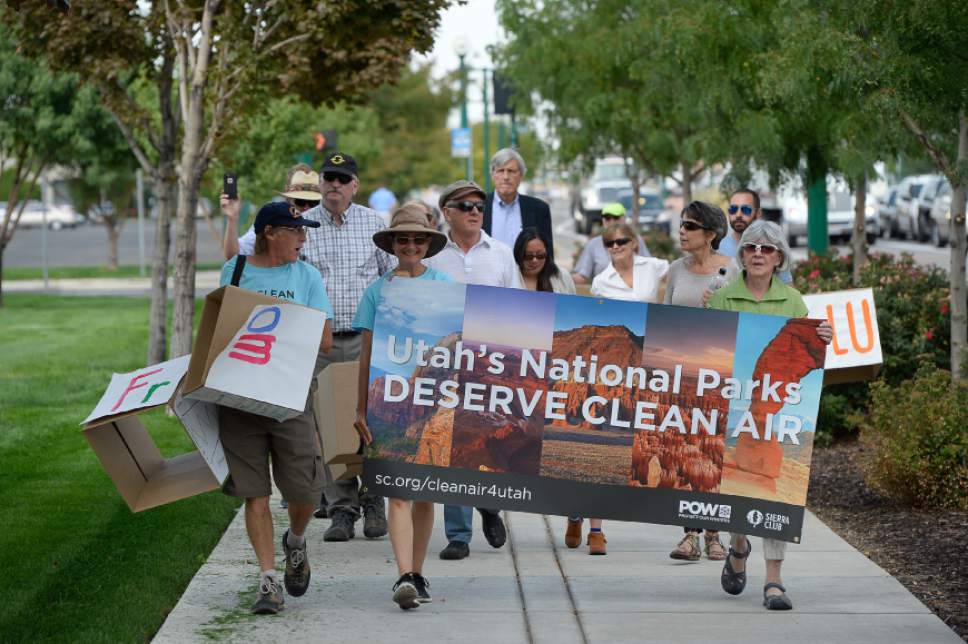This is an archived article that was published on sltrib.com in 2017, and information in the article may be outdated. It is provided only for personal research purposes and may not be reprinted.
In the latest turn of the decade-long dispute over Utah's Regional Haze Rule, Rep. Jason Chaffetz and Sen. Mike Lee introduced federal legislation to overturn a 2016 decision to require additional pollution controls at two Utah power plants.
In a Monday announcement of the proposal, Chaffetz said the U.S. Environmental Protection Agency exceeded its authority when it partially rejected a plan drafted by Utah regulators and decided instead to require emissions-reduction steps at Rocky Mountain Power's Hunter and Huntington coal-fired power plants. He said rejecting the EPA decision would enable Utah to implement its original plan.
The Regional Haze Rule, part of the federal Clean Air Act, mandates the restoration of "natural" air conditions in national parks and wilderness areas by the year 2064. Under that rule, each state is required to develop a plan for reducing emissions from sources near these areas, with EPA determining whether the state plans are acceptable.
Attempts to reach Chaffetz for further comment Tuesday were unsuccessful.
In 2016, according to Chaffetz's statement, the "EPA rejected Utah's plan using criteria not granted in the statute" and "instead used the rule to impose a problematic federal plan that imposes an estimated $700 million price tag, but achieves no visible improvement."
These actions, the Republican said, are "typical of Obama-era federal overreach and must be repealed."
Environmental advocates said the proposal is the latest in a string of attempts by U.S. Congressional leaders to undo rules passed under the Obama administration. The Regional Haze Rule, they say, dates back to the 1970s.
"Utah utilities, communities and the public have worked for years on this rule," said Gloria Smith, managing attorney at the Sierra Club. "There has been so much public process. For Congress to step in and wash all of that away is just politics at its worst."
Smith said the proposal took the Sierra Club by surprise. Traditionally, she said, the U.S. House and Senate have reviewed such administrative rules with an eye on their nationwide impact. This rule, she said, deals solely with the two power plants in Utah's Emery County.
"It seems to me that there is a lot more going on in the country right now," she said, "and it's just hard to imagine that the federal government would want to spend any time on this."
Rocky Mountain Power, Utah's largest electrical utility, along with state regulators, has sued the EPA over its 2016 decision. But company spokesman Paul Murphy said Tuesday the utility was unaware of plans for legislative action until they got a call from Lee's office. Murphy said company officials didn't know Rep. Chaffetz was involved until they read it on Twitter.
Murphy said Rocky Mountain Power would be available to either Chaffetz or Lee "if they have any questions."
Rocky Mountain Power has sought a stay of the EPA's decision while its case is litigated. The court has not ruled on the request, pending a response from the EPA's new administration.
Conn Carroll, a spokesman for Sen. Lee, said the senator was inspired to back the proposal out of hopes it will lower electricity bills for Utah residents.
"It doesn't matter who was in the White House" when the EPA made its decision, Carroll said. "Sen. Lee always wants to make sure that Utahns are not paying more for their power than they absolutely have to."
But an official with National Parks Conservation Association, which in 2015 sued the EPA to prod the agency to complete its then-overdue review of Utah's haze plan, said it suspects the proposal is politically motivated. Dave Nimkin, senior regional director for the association's Southwest Region, said he was disappointed to see the issue of clean air in national parks drawn into the nation's current political turmoil.
"At a time when there is so much discord in this country, there are few things that can unite us," he said. "Our belief is that national parks should ... be the kind of thing that unites us. That's what's so disappointing in the efforts of Rep. Chaffetz to really compromise some of the intrinsic values of our national parks — clean air and view sheds."
Twitter: @EmaPen



